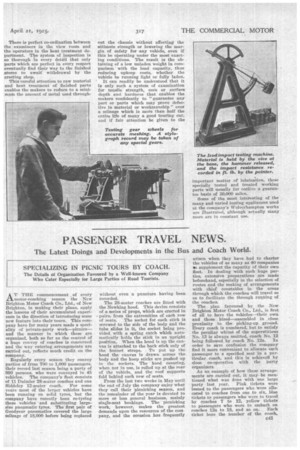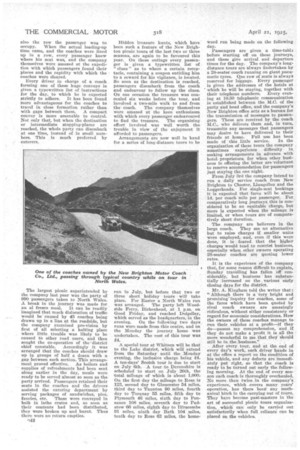PASSENGER TRAVEL NEWS.
Page 25

Page 26

If you've noticed an error in this article please click here to report it so we can fix it.
The Details of Organization Favoured by a Well-known Company Who Cater Especially for Large Parties of Road Tourists.
AT THE commencement of every motor-coaching season the New Brighton Motor Coach Co., Ltd., of New Brighton, in making their plans, apply the lessons of their accumulated experience in the direction of introducing some new feature into their tours. This company have for many years made a speciality of private-party work—picnicsand the manner in which these are organized, both so far as the control of a huge convoy of coaches is concerned and the way catering arrangements are carried out, reflects much credit on the company.
Regularly every season they convey parties of from 700 to 1,000. passengers, their record last season being a party of 990 persons, who were conveyed in 45 vehicles. The company's fleet consists of 11 Daimler 28-seater coaches and one Siddeley 12-seater coach. For some years most of the larger vehicles have been running on solid tyres, hut the company have recently been re-tyring these vehicles and substituting largesize pneumatic tyres. The first pair of Goodyear pneumatics covered the large mileage of 18,000 before being replaced without even a puncture haying been recorded.
The 28-seater coaches are fitted with the Newking hood. This device consists of a series of props, which are erected in -pairs, from the extremities of each row of seats. The socket for each stick is screwed to the side of the body and the tube slides in it, the socket being provided with a spring catch which automatically holds the stick in an upright position. When the hood is up the canvas is attached to the back stick only of the bonnet straps. To put up the hood the canvas is drawn across the body and the hoop sticks are pushed up in the sockets. The hood covering, when not in use, is rolled up at the rear of the vehicle, and the roof supports fold behind each row of seats.
From the last two weeks in May mita the end of July the company enjoy what they call their picnicking season, and the remainder of the year is devoted to more or less general business, mainly single-seat bookings. The picnicking work, however, makes the greatest demands upon the resources of the corn pany, and the occasion has frequently
arisen when they have had to charter the vehicles of as many as 40 companies to supplement the capacity of their own fleet. In dealing with such huge parties, extensive preparations are made beforehand, especially in the selection of routes and the making of arrangements with chief constables in the areas through which the coaches will travel so as to facilitate the through running of the coaches.
The plan favoured by the New Brighton Motor Coach Co., Ltd., is first of all to have the vehicles—their own and those hired—assembled in close proximity to the picking-up ground. Every coach is numbered, but to satisfy the peculiar whima of the superstitious No. 13 is always omitted, coach No. 12 being followed by coach No. 12a. In order to save confusion the company find it more convenient to allocate each passenger to a specified seat in a particular coach, and this is achieved by close co-operation with the party organizers.
As an example of how these arrangements are carried out, it may be men tioned what was done with one large party last year. Pink tickets were issued to the passengers wile were allo cated to coaches from one to six, blue
tickets to passengers who were to travel by coaches 7 to 12, yellow tickets
to passengers who were to embark on coaches 12a to 18, and so on. Each ticket bore the number of the coach, C41 also the row the passenger was to occupy. When the actual loading-up time CAMS, and the coaches were. lined up in a row, every passenger knew where his seat was, and the company themselves were amazed at the expedition with which passengers found their plaees and the rapidity with which the coaches were cleared.
Every driver in charge of a coach forming one of these huge convoys is given a typewritten list of instructions for the day, to which he is expected fitrictly to adhere. It has been found more advantageous for the coaches to travel in close formation rather than with gaps between them. A compact convoy is more amenable to control. Not only that, but when the destination or intermediate stopping-places are reached, the whole party can disembark at one time, instead of in small numbers. This is much preferred by caterers.
The largest picnic superintended by the company last year was the party of 990 passengers taken to North Wales. A break in the journey WAS made for an al fresco meal. It can be readily imagined that much dislocation of traffic would be caused by 45 coaches being drawn up in a line at the roadside, but the company exercised pre-vision by first of all selecting a halting place where little trouble was likely to be caused to other road users, and then sought the co-operation of the• district chief constable. Accordingly it was arranged that the coaches should draw up in groups of half a dozen with a gap between each section. This arrangement proved effective.. As boilers and supplies of refreshments had been sent along earlier in the day, meals were ready to be served almost so soon as the party arrived. Passengers retained their seats in the coaches and the drivers assisted the catering department by serving packages of sandwiches, pies, fancies, etc. These were conveyed in bulk in lathe crates and, so Soon as their contents had been distributed, they were broken up and burnt. Thus there were no return empties.
'342
Hidden -treasure hunts, which have been such a feature of the New Brighton picnic tours of the last two or three seasons, are again to be favoured this year. On these outings every passenger is given a typewritten list of " clues " as to where a certain receptacle, containing a coupon entitling him to a reward for his vigilance, is located. So soon as the destination is reached, passengers disembark from the coach and endeavour to follow up the clues. On one occasion the treasure was concealed six weeks before the tour, and involved a two-mile walk to and from the coach, The company themselves were amazed at the keen enthusiasm with which every passenger endeavoured
to find the treasure. The organizing effort involved was well worth the trouble in view of the enjoyment it afforded to passengers.
Arrangements are now well in hand for a series of long-distance tours to be run in July, but before that two or three short holiday tours will take place. For Easter a North Wales run was arranged. The party left Woodside Ferry, Birkenhead, at 1 p.m. on Good Friday, and reached Dolgelley, which served as the Leadquarters; in the evening. On the following two days runs were made from this centre, and on the Monday the journey home was undertaken. The cost of this tour was £4.
A special tour at Whitsun will be that to the Lake district, which will extend from the Saturday until the Monday evening, the inclusive charge being £4. A ten-days' Scotch tour is due to start on July 6th. A tour to Devonshire is scheduled to start on July 20th, the -total mileage of which is about1,000.On the first day the mileage to Ross. is 123, second day to Gloucester 54 miles, third day to Taunton 90 miles, fourth day to Torquay 55 miles, fifth day to Plymouth 46 miles, sixth day to Penzance 108 miles, seventh day to Padstow 66 miles, eighth day to Ilfracombe 91 miles, ninth day Bath 104 ,miles, tenth day to Ross 63 miles, the home
ward run being made on the following day.
Passengers are given a time-tabla before starting off on these journeys, and these give arrival and departure times for the day. The company's longdistance tours are always findertaken by a 28-seater coach running on giant pneumatic tyres. One row of seats is always reserved for luggage. Every passenger is given the addresses of the hotels at ' which be will be staying, together with their telephone numbers. Every evening at 30.30 telephonic communication is established between the M.O. of the party and bead office, and the company's New Brighton office acts as a bureau for the transmission of messages to passeno-ers. These are received by the coach 31.C., who delivers them and, in turn, transmits any messages that passengers may desire to have delivered to their friends at home. Full use has been
made of this little service. In the organization of these tours the company sometimes experience difficultyin making arrangements in advance with hotel, proprietors, for when other business is offering the latter are reluctant to reserve accommodation for passengers just staying the one night.
From July 3rd the company intend to run a daily service coach from New Brighton to Chester, Llangollen and the Loggerheads. For single-seat bookings it is expected that •fares will be about Id. per coach mile per passenger. For comparatively long journeys this is considered to be an equitable charge, but more is expected when the mileage is limited, or when tours are of comparatively short duration.
The company are believers in the large coach. They see no alternative but to raisecharges if smaller units were employed, and, even if this were done, it is feared that the higher charges would tend to restrict 13usiness, especially when other owners operating 28-seater coaches are quoting lower rates.
It s the experience of the company that, for some reason difficult to explain, Sunday travelling has fallen off considerably, but business has substantially increased on the various early closing days for the district.
Mr. A. Kingham told the writer that: "Although there is a very bright and promising' inquiry for coaches, some of the fares which have been quoted by rival coach owners are amazingly ridiculous, without either consistency or regard for economic considerations. How the owners of these coaches manage to run their vehicles at .a profit—if they do—passes my comprehension, and if they do not make a profit it is all the more wonderful to pm that they should still be in the .business."
. After every tour, and at the end of every day's work, each driver hands in at the office a report on the condition of his vehicle, and any defects are immediately put right, so that the coach is ready to be turned out early the following morning. At the end of every seas on each coach-is thoroughly overhauled. No more than twice in the company's experience, which covers many years' operation, has there beenany mechanical bitch in the carrying out of tours. They have become past-masters in the art of successful picnic tours organization, , which can only be carried out satisfactorily when full reliance can be placed on the vehicles.
































